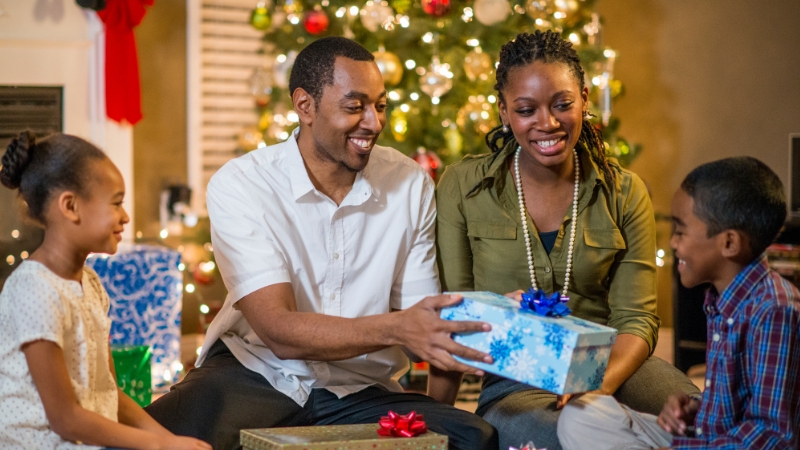How to align expectations with your co-parent?
“Happy Holidays”, “Joyous Kwanzaa”, “Joyeux Noël: ,” “Feliz Navidad…” regardless of what you might call it, this time of year can mean different things to different people. But when you and your co-parent have contrasting expectations for the holidays, it can be a crash course for disaster for your entire family.
If you’re searching for ways to compromise, look no further! Koh-Parenting is here with a roadmap for navigating your way toward a stress free middle ground.
The Gist
The universal themes of traditions and togetherness take on added importance during the holidays. However, those concepts may be celebrated in unique ways depending upon the specific culture, community, and individual. For example, the type and frequency of events and how they are observed- be it with gifts, food, religious ceremony, etc.-can vary greatly.
For co-parents, the season may seem to illuminate differences and cause increased conflict as each parent tries to satisfy their wishes with their child. Prevent negativity from overpowering the holiday experience for everyone by clarifying and managing expectations. Discuss your preferences with your co-parent in advance, and coordinate gift-giving efforts. Consider celebrating all or part of the holiday together, as your child will benefit from seeing his/her parents interacting positively.
If your efforts to collaborate are unsuccessful, resist the urge to vent your disapproval to your child as he/she may take on and/or internalize your stress. Instead, prepare your child for what will happen during the holidays at each household, and highlight the strengths of each. Teach your child the traditions and values that matter most to you and your family when your child is in your care, and focus your attention on holiday activities or rituals that build connections and strengthen your relationship.
Aligning EXPECTATIONS
The holidays hold special meaning for all of us. They have the power to conjure up memories and feelings from years past, and those memories shape our interpretation of the season. But what do you do when your version of the holiday doesn’t match your co-parent’s vision? Read on for tips on how to make two separate holiday celebrations gel in a way that brings enjoyment for you, your co-parent, and your child.
- Plan ahead. Initiate conversations about your expectations for the holidays before they happen. If you don’t know where to start, consult our earlier NL, and we’ll spell it out for you in our Koh-Parenting Newsletter Volume 2: Planning for the Holidays with your Co-parent.
- Don’t make assumptions, and be specific. Rules, routines, and behaviors can be different during the holidays than other times. When plans are loosely-defined or vague, it leaves a lot of room for individual interpretation between you both, and most likely that interpretation won’t be the same. Check for mutual understanding by asking questions of each other and defining details in specific terms. For example, ask your co-parent the specifics about plans such as the location of holiday celebrations, how long they will last, and whether COVID-19 protective measures will be taken to ensure safety.
- If gift-giving is part of your family/culture, collaborate and coordinate your efforts. Holiday gifting is time-consuming and can be especially tricky for co-parents whose kids shift between separate households. Both parents must now be involved in the process for it to run as smoothly as possible.
- Resist the temptation to compete. Resist the urge to retaliate. Two separate holiday plans may bring out the tendency to make comparisons between them both. Meanwhile, the heightened emotions of this time of year may make these comparisons take on a competitive, or even retaliatory, edge. For example, co-parents may try to outdo each other by purchasing lavish gifts for their child or giving in to their every demand. They also may give gifts they know the other parent won’t approve of or would somehow inconvenience him/her.
Unfortunately, these actions create additional conflict during an already stressful time, and such overindulgence doesn’t actually meet your child’s needs. While it may be tempting, avoid using the holidays as a means to act out toward each other. Planning your gifts in advance with your co-parent may prevent this, but if you notice the competitive spirit building, try to resist the urge to engage.

Gift-giving Tips
- For your child: Together with your child, draft a wish list. Then, get to work behind the scenes (in person or through shared documents, messaging, etc) to hash out details. Devise a budget based on each parent’s financial situation, and distribute responsibility for each item. Important things to consider include: will gifts be from both of you collectively, or separately, or a combo of the two? , will you divide the total cost, who will store and wrap, will there be shipping cost, etc?
- For your child to give to others: If your child is expected to give gifts to extended family and/or friends of either parent, he/she will likely need your assistance. Discuss how you will facilitate this with your parenting partner. Your conversation may also cover your preferences in regard to gifts for each of you as well, as your child may wish to buy something for each.
- Celebrate together if at all possible. Logistically, this may be easier for you and your child, as it could mean fewer transitions for people and things. Keeping up with family traditions of years past can also create a sense of normalcy for everyone. On a deeper level, coming together for a positive occasion can mean so much more! It sends a powerful message of unity and calmness that will become a part of your child’s memory bank for years to come.
However, if you and your co-parent are not yet in a place where you could share an entire day peacefully or at ease, you may want to consider carving out small chunks of time that will be more manageable yet meaningful. For example, attend a favorite holiday-themed community event or read a favorite holiday book together, or plan for your child to open gifts with both of you present.
Despite your best efforts, you and your co-parent may still struggle to align your expectations. But even if your co-parent’s decisions contradict yours, you can still find satisfaction throughout the season! In this case, the best course of action is to focus on what you can control, namely, your own behavior. Read on for some tips for moving forward when you can’t come to a consensus.
- Rise above. Your child shouldn’t have to carry the burden of your hurt feelings toward your parenting partner. If your co-parent makes decisions during the holiday that you disagree with, or, even worse, does things to push your buttons, try your best to keep your thoughts to yourself.
Vent or seek support from loved ones or professionals if you must, but refrain from sharing your negative opinions with your child even if your co-parent doesn’t speak well of you. If he/she asks questions about how or why the holiday routine is different between your households, answer simply and with positive regard. For example, if your child mentions the other parent’s promises to spoil them with expensive gifts, you can respond with “Your dad really loves you and wants to show you with these presents; it’s very generous of him. Help your child to appreciate the uniqueness of each of your holiday plans.
- Prepare your child for what to expect. Review the holiday plans for each parent with your child and explain what will be asked of him/her. You can even practice what to do in certain scenarios. For example, if your child will be meeting new people at a holiday event with his/her other parent, brainstorm things he/she could talk about to break the ice or feel less shy”. Knowing what to expect will help your child to feel comfortable and secure.
- Teach your child about your values. Talk about the elements of the holiday season that are most important to you and your family, and then practice what you preach. If you wish to highlight the concept of giving back to others, for example, you could take your child shopping to pick out gifts for a toy drive or donate to a food pantry. Consider focusing your gift-giving efforts on activities involving connection and relationship-building rather than material things. This could include gifts for your child (i.e., giving him/her a certificate for an art class to do together if that suits his/her interest) and gifts for others (i.e., encouraging him/her to bake cookies for loved ones as an act of service).
- Build in some downtime to re-connect. Transitions can be challenging for kids in any circumstance, but even more so for those who must split their time between the two most important people in their lives. This can be easier when rules and routines remain consistent in each household, but as we’ve mentioned this may not always be the case.
Your child may need to re-acclimate after visiting with your co-parent, so build in time for this even during the busy holiday season. Plan to engage in calming activities that will allow your child to release pent-up emotions and reconnect with you. For example, if you’ve just picked up your child, rather than rushing to a holiday party, consider instead heading to a playground to release energy, or putting on quiet music and journaling together, or pounding playdough at the kitchen table.
Working toward a consensus with your co-parent on your holiday expectations may be arduous and emotionally draining, but will be in your child’s best interest. Do your best to find a middle ground; when that’s not possible, take the high ground and forge forward with positivity. In the end, you’ll give your family a gift that lasts a lifetime: the gift of holiday memories filled with peace and harmony.




